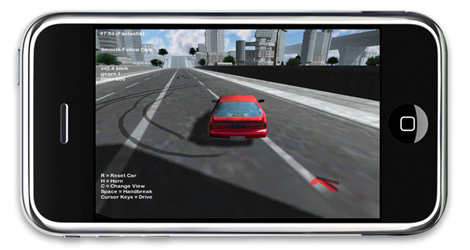No Apps, No Nonsense: How Apple TV Will Win With Gaming
 Apple (AAPL) is preparing to launch a new Apple TV based on the iPhone OS, according to Engadget. The new, smaller gadget -- described as "an iPhone without a screen" -- will face smart TV entrants from Microsoft (MSFT) and the Google/Intel (GOOG) (INTC) alliance announced last week. But contrary to much of the early analysis, the new Apple TV's edge will not be TV-based apps. It will be big-screen gaming.
Apple (AAPL) is preparing to launch a new Apple TV based on the iPhone OS, according to Engadget. The new, smaller gadget -- described as "an iPhone without a screen" -- will face smart TV entrants from Microsoft (MSFT) and the Google/Intel (GOOG) (INTC) alliance announced last week. But contrary to much of the early analysis, the new Apple TV's edge will not be TV-based apps. It will be big-screen gaming.
More about the device itself: Engadget says it will stream in high-definition 1080p video, and rely mostly on cloud-based storage, though media will also be accessible from Apple's Time Capsule hard drives. It will have minimal ports, relying instead on wireless to do the heavy lifting, and will probably link to desktop iTunes libraries just like the current version.
It's no secret that Apple TV has been a hobby for Cupertino, and a rather unsuccessful one. Naturally, everyone's looking for a turnaround story, and the inclusion of the iPhone OS has made some tech journalists little bit drunk with App Store enthusiasm. Though they're not the only ones to suffer this pratfall, the best example is perhaps TechCrunch, which has theorized that Apple will leverage the App Store to gain an advantage on Google and Microsoft. Understanding why this prediction is wrong is crucial to understanding where TV will go in the next new years. First, the basics:
- Apps are designed for small screens, and would require re-release in large, wide-screen format. Few developers are going to be interested in retrofitting their apps when they're busy enough modifying for the iPad.
- The beauty of apps is that they are touch-manipulable -- in other words, they remove the mouse metaphor and let you jump in and grab what you want on the screen. TechCrunch says they envision people using their iPhones as controllers for their TV apps. Huh? This means the iPhone functions as a giant touchpad, returning to the point-and-click cursor model that Apple has done so much to defeat. Not to mention network issues like pairing, setup and lag.
What people are looking for in TV is to be entertained with minimal nonsense: that is to say, they want the best programming with the fewest commercials, the shortest possible browsing and channel-surfing, and the best quality. That's why so many consumers have taken to watching Netflix (NFLX) Watch Instantly, or have hooked up their Hulu-loving computers to their TVs.
Apple half-delivers this with the current iTunes Store, but the shows and movies there are way too expensive ($1.99 per episode? Seriously?) and the selection is incomplete. That's why no one cares about the present iteration of the Apple TV.
Apple could improve things this time around by including a bare-bones version of Safari that can load TV sites like Hulu, ABC (DIS) and CBS (CBS), all of which have announced future-forward Web-based initiatives based on Apple-compatible standards. (Disclosure: CBS Interactive owns BNET.)
But the real draw to the new Apple TV will be iPhone/iPod gaming. The suspicion that the iPhone will be supplemental to the new Apple TV (a la TechCrunch) isn't altogether wrong -- it's merely misplaced. Pairing an iPhone or iPod touch makes sense, because it's already a paradigm established by decades of video gaming. As a game controller, an iPhone or iPod could provide a Wii-like experience: tilt the phone to steer in driving games, or bat it around for something akin to Wii Tennis. There'd still be setup required, and still some lag, but those are issues that gamers already navigate.
Porting iPhone OS games to television screens wouldn't take any developer effort, because games are more like videos than they are like apps: reading text isn't such an issue and some pixellation is tolerable, meaning existing games would look fine on a TV. The rest of the experience would be the same as it is today. Choosing games wouldn't happen on the Apple TV itself; it would all still be located on a player's iPhone or iPod, and streamed to the TV via Apple TV. No need for an Apple TV home screen or App Store -- just pair your phone and play.
Google and Microsoft haven't announced the details of their TV strategies, but the latter will obviously come to this fight well-stocked with gaming experience and hordes of enfranchised Xbox users. The disruption may hit Nintendo hardest. The Wii and the Xbox have appealed to somewhat different crowds, and both systems have sold well. With Apple in play, the casual-gamer demographic that has lately been Nintendo's province may defect. However things shake out, you can bet that the winningest platforms won't do it with social media or apps -- just plain fun.